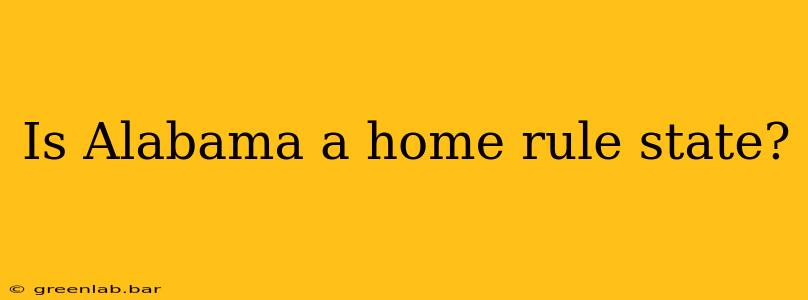Is Alabama a Home Rule State? Understanding Local Government Power in the Yellowhammer State
Alabama's approach to local government is a complex tapestry woven from constitutional provisions, statutory laws, and judicial interpretations. While not strictly a "home rule" state in the purest sense, understanding its framework requires examining the balance between state-granted powers and local autonomy. This article delves into the nuances of Alabama's system, clarifying the extent of local control and highlighting key differences from states with more expansive home rule provisions.
What is Home Rule?
Before exploring Alabama's specific situation, it's crucial to define home rule. In essence, home rule grants municipalities and counties significant authority to govern themselves, often exceeding the powers explicitly delegated by the state. Home rule states typically empower local governments to adopt charters, ordinances, and regulations within broad parameters, fostering greater local responsiveness and self-determination.
Alabama's "Dillon's Rule" Legacy
Alabama operates under a principle akin to Dillon's Rule, a legal doctrine that significantly limits local governmental powers. Dillon's Rule asserts that local governments possess only those powers explicitly granted by the state, those necessarily or fairly implied from expressly granted powers, and those essential to the existence and proper functioning of local governments. This contrasts sharply with the broad autonomy granted under true home rule systems.
Limited Home Rule in Alabama: A Case of Degrees
While Alabama doesn't grant expansive home rule, it’s inaccurate to categorize it as entirely devoid of local autonomy. The state legislature has, over time, granted certain powers to municipalities and counties through enabling legislation. These grants, however, remain circumscribed by the overarching principle of Dillon's Rule. Local governments in Alabama can’t simply enact any ordinance they deem necessary; they must operate within the boundaries established by the state.
Key Differences from True Home Rule States
The key differences between Alabama and true home rule states are stark:
- Charter Flexibility: In true home rule states, municipalities often enjoy the power to draft and adopt their own charters, shaping their governmental structure and powers. Alabama municipalities lack this degree of self-governance.
- Legislative Power: Home rule states grant substantial legislative authority to local governments, allowing them to enact ordinances on a broad range of issues. Alabama's local governments operate under stricter constraints, with the state legislature retaining significant control.
- Taxation Authority: Home rule jurisdictions typically have broader authority to levy taxes and fees to fund local services. Alabama’s limits on local taxation reflect the state's preference for controlling revenue generation.
Conclusion: A Balancing Act
Alabama's approach to local government isn't a simple "yes" or "no" answer to the home rule question. It's a nuanced system reflecting a balance between state control and limited local autonomy. While local governments do possess certain powers, their authority is ultimately subordinate to the state legislature's directives. The state's emphasis on Dillon's Rule ensures that the framework for local governance remains firmly under state supervision. Further research into specific Alabama statutes and case law concerning individual municipalities and counties will provide a more granular understanding of local power in specific instances.

